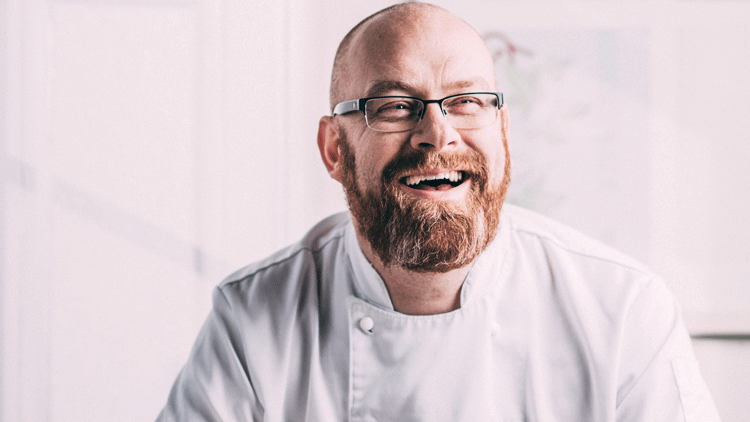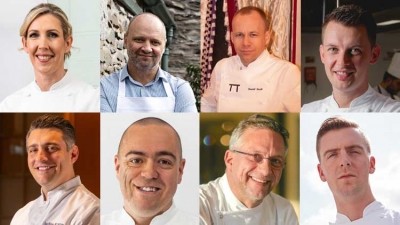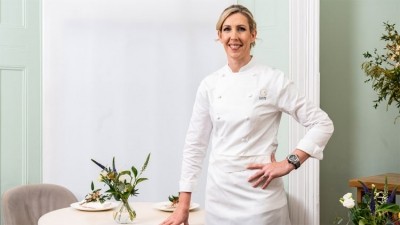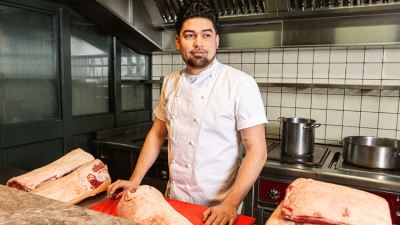Simon Hulstone: “Be the first to serve, it will rattle your opponents”

How did you get into competitions?
My dad (Roger Hulstone) was a chef and was big on the competition scene back in the day. As a young cook I went to work for his main competitor Freddie Jones. He was the man for competitions; they called him the jelly master. He headed up the kitchen at a restaurant in Croydon that wasn’t particularly well known. I chose a slightly different path - I wanted to do well in competitions but I also wanted to cook in great restaurants.
Where did you end up working after that?
I still sought out places run by competition chefs, including Michael Kitts at The Swallow Royal Hotel in Bristol. He had come from The Ritz so had a strong grounding in classical cooking. All of his chefs were regularly competing in competitions and he’d competed in National Chef of the Year. My next job took me to Cheltenham where I met David Everitt-Matthias, who held two Michelin stars and won National Chef of the Year in 1996.
How many competitions have you competed in?
75 national and 35 international. I would say I’ve done every major competition available to a UK chef. Highlights include the World Skill Olympics (which is now called the World Skills Competition) when I was 20. I competed against 32 countries and won, and I was also the highest-scoring competitor worldwide regardless of the skill. I won the Roux Scholarship in 2003 and have represented the UK in numerous international competitions, including the European Culinary Championships, the Culinary Olympics and the Culinary World Cup.
What about the National Chef of the Year?
That was a bucket list thing for me as dad had competed in it twice but sadly never won it. I first entered it when I was 24 and won it six years later in 2008 (the competition was held every two years at the time).
And you also represented the UK in the Bocuse d’Or...
The first time I competed was the same year I won the National Chef of the Year. I only had three weeks to prepare (André Garrett had pulled out), had very little support and knew next to nothing about the competition. It was like Cool Runnings. I turned up with a Thermomix in a backpack and watched a Norwegian guy pull up in an artic and unload an entire professional kitchen. Needless to say, the first time I competed I got absolutely battered. It was pretty embarrassing. But the next time round there was a bit more support and we pushed hard and I ended up coming fourth in the European Final (in 2010), which I was happy with.
How has the competition landscape changed over the years?
Competitions have been gaining more traction with skilled restaurant chefs. That’s good, but it has changed things. People are less and less interested in cold work - including butter sculptures, platters and pastillage (things made from sugar paste) - which is a shame as it’s an amazing skill. But it’s time consuming and most businesses can’t fund it. Plus the older boys that trained it have moved on, they’re not really in kitchens anymore.
How did you balance competitions with running a successful restaurant?
We took over The Elephant (in Torquay) in 2005. My business partner at the time was not overly keen on me doing competitions as he wanted all my attention to be on the restaurant. But we won a Michelin star in 2006 (which the restaurant has retained ever since) so I think we were still able to deliver. But it was tough in the early days, especially with the recession.
When did you last compete?
About 10 years ago. I prefer to judge and mentor my own guys now. Nobody wants to see an old man cooking. And - if I'm totally honest - I don’t think I’ve got much left to prove. After the major competitions I was doing competitions mostly for the prizes, whether it be holidays, money or products. It helped me travel round the world and paid for a lot of things.
Why should chefs do competitions?
Chefs don’t have much time to themselves so hobbies are difficult - we’re always working. The great thing about cooking competitions is that it’s a hobby you’re already proficient in. It has the potential to take you around the world and is brilliant for making contacts. You get to see different restaurants and different styles of food.
What are the attributes of a good competition chef?
They’re identical to that of a good restaurant chef. Timing, skills, taste, flavour, controlling the heat, being able to take things on the chin... it’s all there.
What are your tips for success?
Practice makes perfect. I did 18 full practices in the run up to the Bocuse d’Or World Final. It took a whole day to do the mise en place and another day to cook and clean down. It almost goes without saying but you must be extremely organised - label everything. I’ve mainly done competitions that revolve around three or four course meals. My tips for that format would be to get your dessert ready first. You want the sweet ready in the fridge so you can just pull it out at the end. And chose something safe that sets through heat - don’t ever try and make a frozen dessert or a soufflé, that’s just asking for it. My final tip is always be the first to serve if you have the option. It will rattle your opponents and give you a mental boost.
The National Chef of the Year competition is now open for entries. Click here for more information.

































